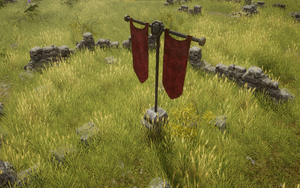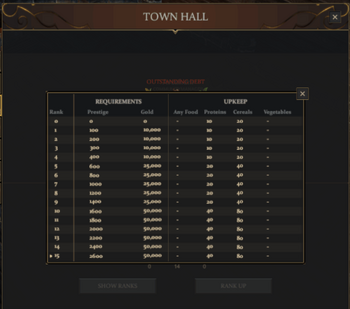A town area is a pre-defined area of the map where a village or city used to exist on Elysium in the days before the Fracture. It can be reclaimed by players to fund and develop a new settlement.
There are 2 types of towns:
- NPC towns serve as starting locations and hotspots for new players. They feature basic facilities that cater to the basic needs of players and can’t be conquered.
- Player towns which are built by players on an unclaimed city area. A group of 20 players can start a new settlement on an unclaimed city area, and one of the 20 becomes the Governor with the authority to grant settlement membership, excommunicate members, decide where to place buildings and which technologies to invest in, as well as set the purchase price of residential lots of land, decide the tax rate applied to people and shops in town and manage the town’s money. Also the Governor can delegate some of their responsibilities to Vice-Governors.
Town Location
Where you place your town matters. You’ll first want to consider which gaming aspects you’d like to invest in, like blacksmithing or carpentry, and if those resources are nearby. After all, you won’t want to haul wood halfway across Syndesia just because you’ve joined a town on the outskirts of a copper mine.
For this reason there are predefined town areas. Those areas are locations where a village or city used to exist on Elysium in the days before the Fracture. They are yours to claim and develop a new settlement. If abandoned, you’ll find monsters roaming around as well as the ruins of buildings past.
Town Progression
Settlements in Fractured Online are broken down into 15 ranks across three stages. The first stage is called a Hamlet. All settlements start here. From there they progress to Village status, and then ultimately to Town status. How do they progress? Through gold, prestige, and upkeep costs.
Prestige points are based on the number and types of buildings a town contains. Gold (in-game currency) is consumed only when ranking up a town, while upkeep also has to be paid on a regular basis, and consists of different types of edible resources (cereals, proteins, and vegetables).
As a town grows and climbs to ranks, it is rewarded with research points. Those points are for the governor to invest in the tech tree, ultimately allowing to unlock skills and crafting and enchanting possibilities. The current tech options include Tailoring, Masonry, Witchcraft, Carpentry, Blacksmithing, Trading, and Religion. As your settlement increases in rank, specific skills in each branch are unlocked according to settlement status.
As the number of ranks and therefore research points are limited, you’ll need to decide wisely which branches to invest in and which skills to unlock.
Prestige
The most important metric of a town is its prestige counter, based on the number and types of buildings it contains, and the contributions of its citizens to civic life. The prestige progression of a town in any given week compared to the previous one causes it to be tagged as Decaying, Stable, or Thriving. Total prestige can earn the town the title of Village and Town.
A city will be indicated as an Hamlet as long as its rank is lower than 4.
Past that, it will be know as a village until rank 9, and then as a Town until 14.
Upon reaching the maximum rank of 15, the city will be knows a Metropolis.
Politics
Siege/PvP
Towns can be attacked, either to steal resources or to try and take control of the city.
See: Raiding and Sieging
Buildings
Depending on the technologies known by the city, the governor and vice governors will be able to place the blueprints for many different buildings:
- Bank
- Marketplace
- Prison
- Siege Workshop
- Blacksmith
- Carpenter
- Magic Shop
- Tailor
- Tavern
- Shrine
- Town Hall
- Workshop
Personal parcel
Land parcels can be claimed by citizens, allowing them to build their own houses within the city. Having a plot inside the perimeter of a city presents certain advantages compared to one outside of it. First of all, these plots do not pay weekly taxes.
Also, erecting an house on one of these plots will increase the prestige of the city, allowing it to raise in ranks.
Roads
Governor can delete or build roads. Type of roads: dirt, paved.
| FRACTURED wiki | |
|---|---|
| Main Pages | |
| Game Mechanics | |
| Character Related | |
| Skill Related | |
| More Information | |


